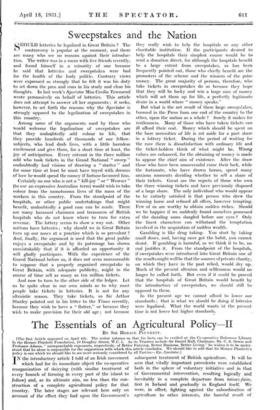Sweepstakes and the Nation
SHOULD lotteries be legalized in Great Britain ? The controversy is popular at the moment, and there are many who see no reasons against their introduc- tion. The writer was in a room with five friends recently, and found himself in a minority of one because he said that lotteries and sweepstakes were bad for the health of the body politics Contrary views were expressed so strongly that he felt it was his duty to set down the pros- and cons in his study and clear his thoughts. In last week's Spectator Miss Cecilia Townsend wrote persuasively on behalf of lotteries. - This article does not attempt to answer all her arguments ; it seeks, however, to set forth the reasons why the Spectator is strongly opposed to the legalization of sweepstakes in this country.
Among some of the arguments used by those who 'would welcome the legalization of sweepstakes are that they undoubtedly add colour to life, that they provide hundreds of thousands of our fellow- subjects, who lead drab lives; with a little harmless excitement and give them, for a short time at least, the joy of anticipation. Every entrant in the three million odd who took tickets in the Grand National " sweep " undoubtedly had visions of drawing a " starter " and for some time at least he must have toyed with dreams of how he would spend the money if fortune favoured him.
Certainly no one who is not a " kill-joy " or " Wowser " (to use an expressive Australian term) would wish to take colour from the monotonous lives of the mass of the workers in this country. From the standpoint of the hospitals, or other public undertakings that might benefit, undoubtedly a good case can be made. There are many harassed chairmen and treasurers of British hospitals who do not know where to turn for extra revenue. The lottery seems to show a way out. Other nations have lotteries ; why should we in Great Britain turn up our noses at a practice which is so prevalent ? And, finally, the argument is used that the great public enjoys a sweepstake and by its patronage has shown unmistakably that if it is afforded an opportunity it will gladly participate. With the experience of the Grand National before us, it does not seem unreasonable to suppose that a properly organized sweepstake in Great Britain, with adequate publicity, might in the course of time sell as many as ten million tickets.
And now to turn to the other side of the ledger. Let us be quite clear in our own minds as to why most people take tickets in lotteries. It is not for any altruistic reason. They take tickets, as Sir Arthur Stanley pointed out in his letter to the Times recently, because they wish to have a " flutter," or because they wish to make provision for their old age ; not because they really wish to help the hospitals or any other charitable institution. If the participants desired to help the hospitals their simplest course would be to send a donation direct, for although the hospitals benefit to a large extent from sweepstakes, as has been frequently pointed out, those who chiefly benefit are the promoters of the scheme and the winners of the prize money. The great majority of persons, therefore, who take tickets in sweepstakes do so because they hope that they. will be lucky and win a large sum of money which will set them up for life, a perfectly legitimate desire in a world where " money speaks."
But what is the net result of these large sweepstakes, boomed in the. Press from one end of the country to the. other, upon the nation as a whole ? Surely, it makes for restlessness. Many of those who have taken tickets can ill afford their cost. Money which should be spent on the bare necessities of life is set aside for a part share in a lottery ticket. During the period of waiting for- the race there is dissatisfaction with ordinary life and the ticket-holders think of what might be.. Wrong values are enhanced, for the obtaining of money is made to appear the chief aim of existence. After the draw those who have been unsuccessful curse their luck, while the fortunate, who have drawn horses, spend many anxious moments deciding whether to sell a share of their tickets. Great are the regrets of those who own the three winning tickets and have previously disposed of a large share. The only individual who would appear to be entirely satisfied is that person who drew the winning horse and refused all offers, however tempting. Few of us are worthy to obtain sudden riches. Should we be happier if we suddenly found ourselves possessed of the dazzling sums dangled before our eyes ? Only the finest characters can withstand the temptation involved in the acquisition of sudden wealth.
Gambling is like drug taking. You start by taking small doses, and, having once got the habit, you cannot desist. If gambling is harmful, as we think it to be, no end justifies it. From the standpoint of the hospitals, if sweepstakes were introduced into Great Britain one of the results might well be that the sources of private charity, on which they have in the past relied, would dry up. Much of the present altruism and selflessness would no longer be called forth. But even if it could be proved that the hospitals of Great Britain would benefit by the introduction of sweepstakes, we should still be opposed to them.
In the present age we cannot afford to lower our standards ; that is what we should be doing if lotteries were legalized. What the world wants at the present time is not lower but higher standards. .














































 Previous page
Previous page